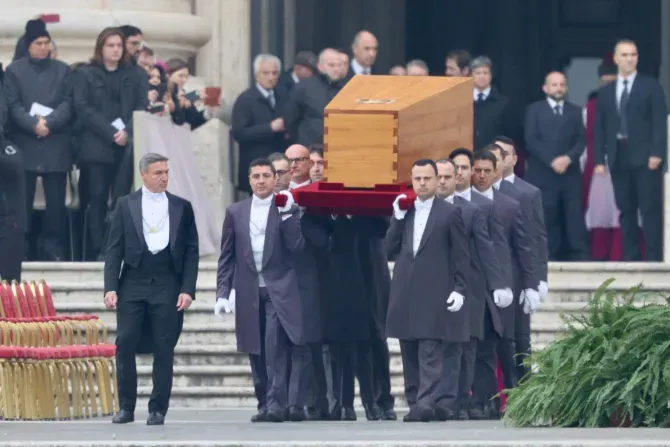Poland’s President Andrzej Duda, Hungary’s Prime Minister Viktor Orban, Czech Prime Minister Petr Fiala, and Slovenian President Nataša Pirc Musar came to the Vatican to attend the ceremony, along with European royals Queen Sofia of Spain and King Philip and Queen Mathilde of Belgium.
In the Prayers of the Faithful, the second prayer was said in German: “For Pope Emeritus Benedict, who has fallen asleep in the Lord: May the eternal Shepherd receive him into his kingdom of light and peace.”
The readings for the Mass were Isaiah 29:16–19 in Spanish; Psalm 23 sung in Latin; 1 Peter 1: 3–9 in English, and the Gospel of Luke 23:39–46 read in Italian.
At the end of the funeral Mass, Pope Francis presided over the Final Commendation and Valediction, which were followed by a moment of silent prayer.
Pope Francis approached with a cane and prayed while touching the wooden coffin of his predecessor.
(Story continues below)
Bells tolled and the crowd applauded as Benedict XVI’s coffin was carried into St. Peter’s Basilica to his place of burial in the basilica crypt. People waved flags and banners, including one that said “Santo Subito,” calling for Benedict’s immediate canonization.
Born Joseph Aloisius Ratzinger, he was elected to the papacy in April 2005, taking the name Benedict XVI, after decades of service to the Catholic Church as a theologian, prefect for the Congregation for the Doctrine of the Faith, cardinal, and one of the closest collaborators of St. John Paul II, whom he succeeded as pope.
Widely recognized as one of the Catholic Church’s top theologians, Benedict’s pontificate was marked by a profound understanding of the challenges to the Church in the face of growing ideological aggression, not least from an increasingly secular Western mindset, both within and outside the Church. He famously warned about the “dictatorship of relativism” in a homily just before the conclave in 2005 that elected him pope.
On Feb. 11, 2013, the 85-year-old Benedict shocked the world with a Latin-language announcement of his retirement, becoming the first pope in 600 years to do so. He cited his advanced age and his lack of strength as unsuitable to the exercise of his office.
Reflecting on life after death in an Angelus message on Nov. 2, 2008, Pope Benedict XVI said eternal life will be like “immersing yourself in the ocean of infinite love where time — a before and an after — no longer exists. Fullness of life and joy: This is what we hope for and expect from our being with Christ.”








